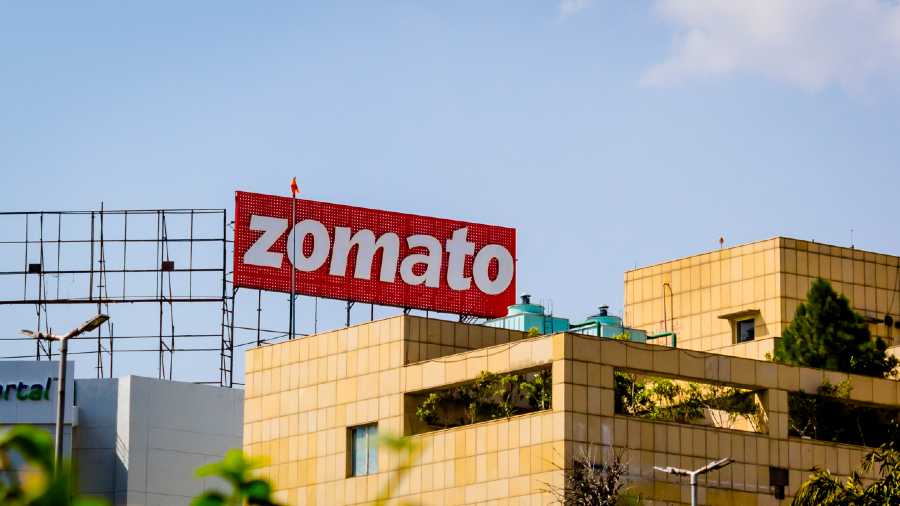Shares of fast-growing food-delivery start-up Zomato rocketed as they made their stock exchange debut, bolstering the outlook for a string of new Internet-based firms set to hit the market. Zomato shares opened at a 53 per cent premium over the issue price of Rs 76 and extended their gains to trade up as high as 82.2 per cent.
The stunning trading start by Zomato, backed by Jack Ma’s Ant Group and the first of a series of Internet unicorns aiming to tap the Indian market, came after the company’s Rs 93.75 billion initial public offering (IPO) was 38 times oversubscribed.
“Today is a big day for us. A new Day Zero,” said Zomato's co-founder and Chief Executive Deepinder Goyal, who kept his role in the company’s launch a secret from his teacher parents for a long time, fearful they would disapprove of the risk he was taking. “The tremendous response to our IPO gives us the confidence that the world is full of investors who appreciate the magnitude of investments we are making, and take a long-term view of our business,” Goyal wrote on the company’s website.
Shares of Zomato stormed 82.2 per cent higher in early trade, giving the company a market capitalisation of about $12 billion, more than pharmaceutical giant Dr Reddy’s or food heavyweight Britannia. The company was trading at a massive 65 per cent premium to its IPO issue price on Friday afternoon.
The blistering market debut came despite concerns expressed by some analysts that the loss-making firm was overvalued. Zomato lost Rs 812 crore in the last financial year. But those losses were down by 65 per cent from the previous year. Zomato’s also flipped its performance on each order to earn an average of Rs 20.5 on every order in the last financial year from a loss of Rs 30.5 in the previous financial year, thanks to better efficiency
Zomato’s performance is seen as a barometer of investor appetite for the country’s fast-multiplying unicorns – start-ups that have a value of at least $1 billion. (According to Bloomberg, India is spawning unicorns at the rate of three a month). In fact, while many businesses hit rock-bottom during the devastating Covid-19 second wave, India added 11 new unicorns, bringing its total to 48. Only the US and China have more unicorns.
Other Internet-based companies being lined up for IPOs include digital payment service PayTM, hospitality company OYO, ride-hailing platform Ola and Mobikwik. Pavan Pai, who’s a founding partner of the VC firm 3one4 Capital, notes that “over a dozen companies are planning IPOs now,”
Loss--making Paytm, which is also backed by China’s Ant Group is expected to seek to raise as much as $3 billion Zomato, whose other blue-chip venture-capital investors include Tiger Global and Kora, has been favoured by investors thanks to its “first-mover advantage” in the food-delivery segment that puts it “in a sweet spot as the online food-delivery market is at the cusp of evolution,” said Motilal Oswal brokerage analyst Sneha Poddar.
It’s already been a blockbuster year -- in fact the busiest in 12 years -- for IPO listings on Indian exchanges with $5.6 billion raised so far from investors in the red-hot Indian share market’s defied gravity throughout the pandemic. Analysts project that the total capital raised this year from IPOs could be close to $10 billion, Zomato, which was founded in 2008, operates in 525 Indian cities and is present in 23 other countries though it says going forward it plans to focus on India. It’s now the market leader in terms of its gross order value or GOV and it plans to use the money raised to focus on organic and inorganic growth.
As for investors in IPOs this year, they’re smiling all the way to the bank with their shares up by an average of 62 per cent, according to Bloomberg. Investment bankers in charge of Zomato’s IPO are also happy -- they reaped Rs 93.75 billion in fees, one of the richest payouts from an Indian initial offer, according to documents.
Some analysts warn that the Indian market is hugely overvalued and that investors should be cautious about this new generation of Internet-based IPOs which are still cash-burning operations.
Stock market valuation expert Aswath Damodaran, who teaches at NYU’s Stern School of Business, valued Zomato at just Rs 41 per share, way below its offer price of Rs 76 and listing price of Rs 115.
“Zomato is a money-losing,cash-burning enterprise now, but it has immense market potential… and a viable business model,” Damodaran said in a blog post. Still, he added, “I would have no qualms about investing in the stock, if the price drops in the near future, with the full understanding that this is a joint wager on a company, a sector
and a country.”











